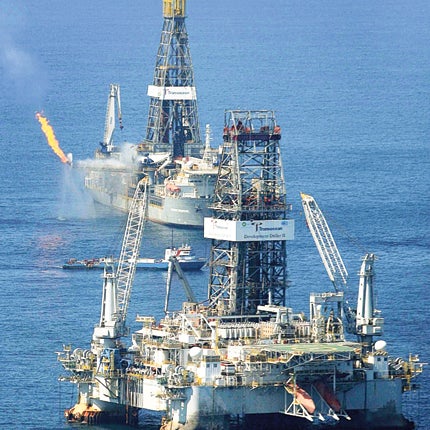Sean O'Grady: America has become a hostage of its own quest for energy security

America faces a problem, a dilemma so fundamental that not even the political skills of Barack Obama can disguise it, heightened by, but not originating in the BP affair: She either risks her environment by drilling for more domestically sourced oil, or she accepts the need to import more from a turbulent world – jeopardising her "energy security".
Curiously, it was George Bush, the toxic Texan, who told Americans to give up their "addiction to oil", but at least he was realistic enough to recognise that they wouldn't, and that renewables would never take up the strain.
Only by sacrificing the pristine natural wilderness in Alaska and parts of America's coastline could the US ever hope to stop being beholden to the Middle East, central Asia and other areas of political instability for her hydrocarbons. Eventually, and much against his instincts and campaign vows, Barack Obama came to the same conclusion, and relaxed drilling rules; but he may have to execute another U-turn, or be forced to do so by state leaders such as Arnold Schwarzenegger, and issue a moratorium on new drilling sites. Or he could just bash BP and hope the real issue goes away.
Yet, stark as it is, America's dilemma is nothing to the existential one BP now faces. Its US interests are immensely important – more than a third of its worldwide revenues and a similar proportion of the profits it makes from exploration and production – the "upstream" part of the business that went so spectacularly wrong in the Gulf of Mexico.
The question is not so much whether BP survives unscathed in the US as much as how it retreats from there. In the worst case, the US authorities could force the firm to divest its drilling rights in the Gulf and elsewhere, leaving the downstream end – refining oil to make and market petrol, chemicals and plastics – badly exposed, if not unviable. Vertically integrated oil has been a way of life for all the world's big players since the stuff was first found. Replacement oil from oil sands in Canada are too small and expensive to make up for the loss of US production. A sale or float of BP's American interests would leave one of our few world-class firms dismembered, an historic moment in declining British industrial prestige and power.
The only remote parallel to such a move was the strangely autonomous Shell Oil company of the US, which lived a life almost completely divorced from its Anglo-Dutch Shell namesake from 1922 until the 1990s, an early example perhaps of American insularity and exceptionalism but also the fact that the US business, especially in California, had simply become so large it had to move out.
In any case, for 60 years and more, all the US Shell firm and its rest-of-the-world counterpart had in common was the famous name and a subtly different version of the instantly recognisable red-and-yellow logo and livery. When Tony Curtis tried to pass himself off to Marilyn Monroe as the heir to Shell Oil in Some Like It Hot, it was a (slightly) more plausible claim than it appeared, given the separate corporate structure of the US firm. The two Shells were owned and run by different people; Americans, out of Houston, and non-Americans, from London and The Hague.
Perhaps such a detached future may be the best thing for British Petroleum's interests in the US. Even if they were demerged, both BP firms would still be huge. Is that the future for BP America? Or American Petroleum, as we may soon have to call it.
Join our commenting forum
Join thought-provoking conversations, follow other Independent readers and see their replies
Comments
Bookmark popover
Removed from bookmarks